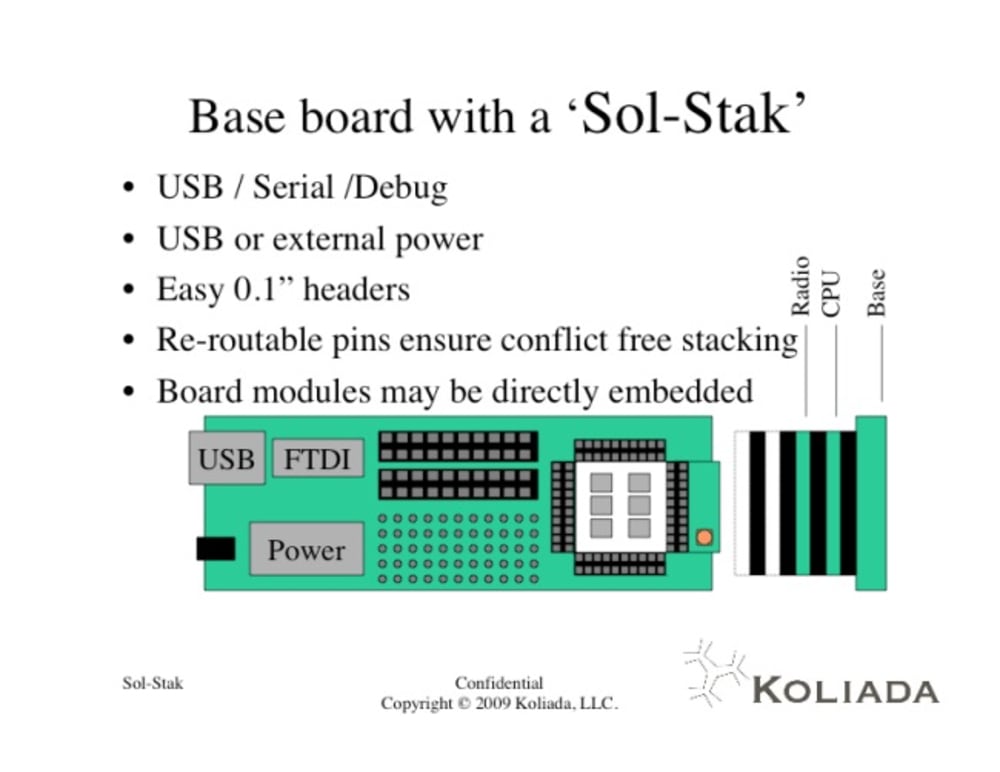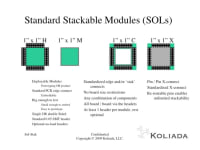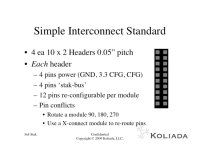Introduction
------------
Sol-Stak is an open, small system, embedded prototyping paradigm.
We do a lot of prototyping across multiple vendor systems. Reference designs and software support for these systems are a fragmented, multi-standard, multi-faceted, mess.
Prototyping embedded systems has very particular focus and objectives. The last thing you want to bother with when proving a product design is dealing with anything that isn't directly relevant to the product design.
Sol-Stak embedded development significantly reduces extraneous complexities of embedding small electronic components and functions in a product.
Problem
-------
Embedded Prototyping:
- Little to no ‘commoditization’
- Specialty hardware, simplistic integration
- Specialty software, little to no integration
- Few or fragmented standards or interconnects
- Reference designs are expensive to produce
- Limited access
- Little to no third party leverage
- Fragmented, heterogeneous, design standards
-> Embedded Prototyping is still time consuming, cumbersome and costly
Characterization
----------------
Keys to Prototyping Success:
- Focus on the specific attributes to be evaluated
* Component capabilities
* Software/Firmware scope and complexity
* System integration issues
* System functional behavior
* Overall System Capabilities
-> Prototyping Leverage
- Prototyping risk is directly proportional to prototyping complexity:
* Board layout & soldering skills
* Chasing down incidental parts required to test
specific components.
* Figuring novel ways to interconnect multiple vendors
reference boards
* Learning & wiring multiple vendors quirky support
software.
-> Prototyping Frustration
-> Eliminate or reduce extraneous complexity
Solution
--------
Sol-Stak is a simple, small, embedded prototyping standard:
- Standard format, ‘stackable’, modules
- Standard, re-routable, interconnect
- Standard software tools
- Simple, low cost I/O
- Directly Extensibility, directly embeddable
- Leveragable
Sol-Stak solves the problem of unified prototyping of heterogeneous devices:
- open standard
- multi-vendor participation
- uniform software / hardware access standards
- standardized hardware configuration
Sol-Stak has novelty not previously seen in prototyping
- Sol-Stak interconnect pins may be re-routed between
modules.
- Allows virtually infinite stacking options, even in
the face of conflicting multi-vendor I/O selections.
- Sol-stak prototyping modules are designed to be
directly embedded for production.
Sol-Stak Benefits:
- Reduce prototyping time
* Ready made reference modules
* Leveragable gerbers
* Deployable, embeddable, modules
- Reduce prototyping complexity
* Pre-defined, debugged & working, modules
* Leveragable gerbers
* Programmable interconnect
* Uniform software support
Summary
-------
We designed Sol-Stak because we do a lot of prototyping across multiple vendor systems. Reference designs and software support for these systems are a fragmented mess.
Traditional standardization efforts have not allowed for interconnect re-routing and thus provide little scope for variety in mapping boards to available pins.
Re-routing is a critical piece of the sol-stak architecture as it allows vendors to produce modules with little concern for pin i/o constraints.
Sol-stak also anticipates that other prototyping bug-bear - how to quickly get a reference design into prototype. Sol-Stak allows for direct embedding of its modules in production prototypes and products without adding undue bulk or connectivity cost.
Like this entry?
-
About the Entrant
- Name:Guy Mcilroy
- Type of entry:teamTeam members:Guy McIlroy
Bruce Lundeen - Software used for this entry:Orcad,
- Patent status:none








